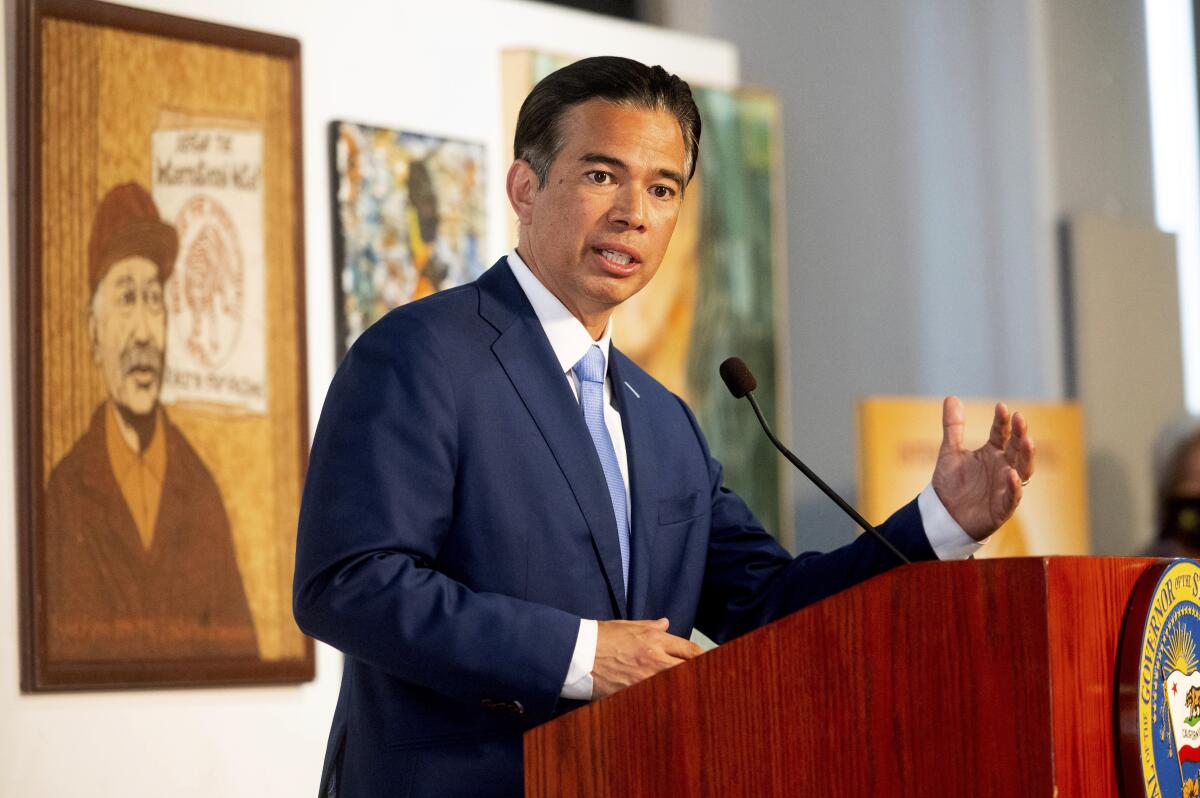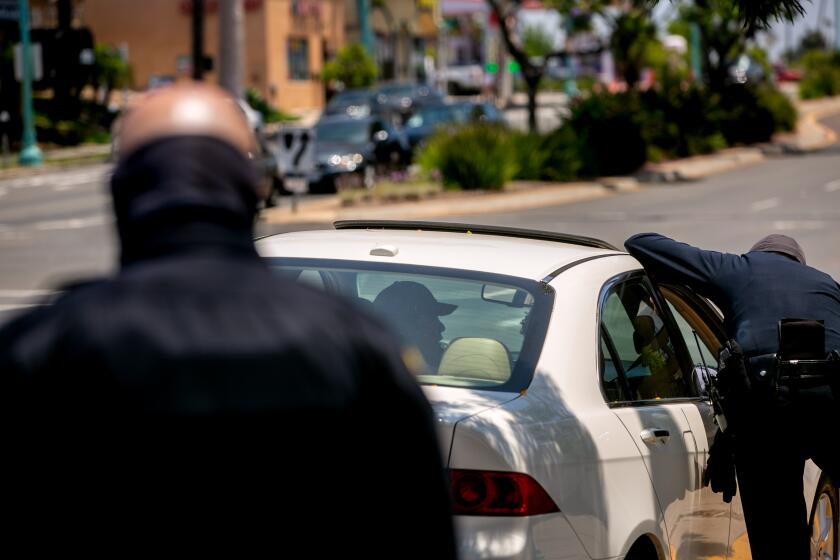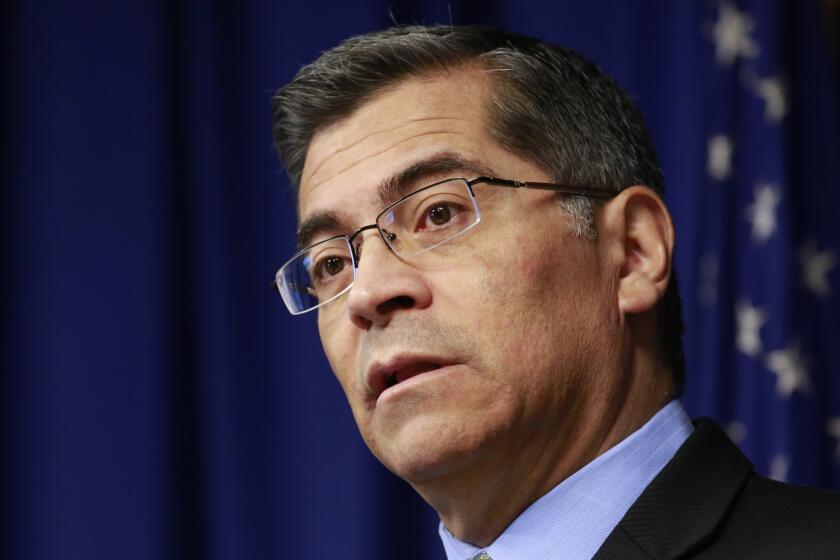Attorney general forces Bakersfield to reform troubled police department

- Share via
After citing civil rights violations by the Bakersfield Police Department, California Atty. Gen. Rob Bonta on Monday announced a stipulated judgment that will require comprehensive reforms by the city and its police force.
The judgment, which does not require an admission of fault, will impose an independent monitor and end a nearly five-year investigation into accusations of excessive force, stops of minorities and practices involving the use of police canines.
“As attorney general, I’m committed to strengthening trust between our communities and law enforcement. That is a critical part of public safety,” Bonta said at a media briefing. “Where there’s injustice, we must correct it. This agreement with the city and its police department will help make that happen. The findings of our investigation demonstrate how critical it is that we act.”
Scientists who listened to police officers speaking to motorists they’ve pulled over heard differences in the tone of voice used with Black and white drivers.
City leaders agreed to the reforms and oversight after finding the Police Department “failed to uniformly and adequately enforce the law, leading to a pattern or practice of conduct that deprives residents of constitutional protections” that included the “use of unreasonable force, as well as unreasonable stops, searches, arrests and seizures.”
Bonta said the investigation, which began in 2016 under then-Atty. Gen. Kamala Harris, was prompted by “the Bakersfield Police Department’s failure to adequately enforce the law.”
A recent ACLU report found that when compared with departments in cities with similar crime rates or higher, Bakersfield’s rate of police killings was ninth in the country and the second-highest in California. The report found that in 2018, 25% of the people arrested after a use-of-force incident were charged only with resisting arrest. In 2019, that number was 21%.
Among other issues under investigation were the department’s police stops without adequate probable cause and the use of deadly force against those with mental health issues, Bonta said.
Based on complaints and media reports, the attorney general’s office began investigating in December 2016 whether Bakersfield police had violated state or federal laws in the use of excessive force.
Among other serious violations the department was accused of: failure to provide meaningful access to police services to individuals with limited English proficiency; failure to adequately maintain a meaningful program to address civilian complaints; and the lack of a comprehensive community policing program.
Bonta concluded that the department failed to uniformly and adequately enforce the law, “leading to a pattern or practice of conduct that deprives residents of constitutional protections.”
The Kern County Sheriff’s Department entered into a similar agreement last year with the attorney general’s office to overhaul its policies and practices.
The Kern County Sheriff’s Office and state attorney general have agreed to policing reforms to resolve an investigation of potential civil rights abuses.
The ACLU of Southern California said in response to the judgment that given the seriousness of the findings, the reforms fall far short of what is needed for true change.
“It will not, on its own, eliminate deeply harmful practices such as the use of canine force or discriminatory traffic stops for excessive force and intimidation, especially on Black and brown community members,” ACLU Southern California staff attorney Stephanie Padilla said.
Before Monday’s judgment, Bakersfield police had previously implemented three reforms: outfitting officers with body cameras, volunteering to collect data early under the state’s Racial and Identity Profiling Act and implementing a community collaboration initiative.
But Bonta said the stipulated judgment, which will be overseen by an independent monitor and backed by court-enforced compliance, will go further. It will include an extensive revision of use-of-force policies for the Bakersfield Police Department, “focusing on de-escalation.” It also will modify rules for the use of stun guns, the handcuffing of children and the use of police canines on arrestees while establishing a community policing committee.
There will be retraining when it comes to police stops, an analysis of race-stop data and new crisis-intervention training for dispatchers, as well as a revised complaint procedure, Bonta said.
In agreeing to the deal, Bakersfield Police Chief Greg Terry said neither the department nor the city conceded that police procedures were fallible. The city could have fought the state, he said, but instead opted for changes and progress it already was making.
“After much deliberation — and upon my recommendation — the city decided to adopt this agreement,” Terry said. “The decision came down to a choice between litigating the past or controlling our future, reassuring our community and moving forward in a positive way. The agreement is detailed, and in many instances exceeds state law, reflecting improvements that the Police Department has already made or was already in the process of making on its own.”
The move comes as several other departments remain under investigation by Bonta’s office, including the Los Angeles County Sheriff’s Department and the San Francisco Police Department.
More to Read
Sign up for Essential California
The most important California stories and recommendations in your inbox every morning.
You may occasionally receive promotional content from the Los Angeles Times.












